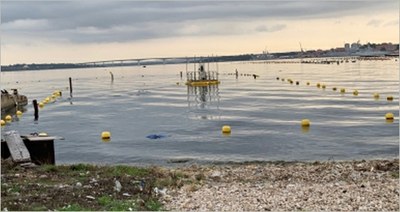Environment: EU project for remediation of the "Mar Piccolo" in southern Italy
30/1/2020
 Experimenting with an innovative, ecosystem-friendly, low cost and easy-to-use technology for the remediation of waters and sediments polluted by heavy metals in the Mar Piccolo of Taranto.
Experimenting with an innovative, ecosystem-friendly, low cost and easy-to-use technology for the remediation of waters and sediments polluted by heavy metals in the Mar Piccolo of Taranto.
This is the aim of the European Life4MarPiccolo project, which sees ENEA as leader of a team that includes IRSA-CNR, the Municipality of Taranto, Genelab and Nova Consulting.
The remediation project is based on a mobile system, located in the first inlet of the Mar Piccolo near the Tamburi district, capable of acting on a marine surface area of approximately 3,000 m2. Firstly, the sediment is conveyed into a membrane-microfiltration treatment system. Once the particle fraction has been removed, the plant returns the decontaminated water, and a part of the fraction in which the pollutants are present is sent for biological remediation (effected by means of fungal microorganisms).
The Life4MarPiccolo project will also enable monitoring of the behaviour patterns of these microorganisms, which can “biodegrade” some pollutants (by transforming the pollutants into non-harmful − or even useful − compounds).
The plant, powered by photovoltaic energy, rendering it self-sufficient, can be replicated both for short stretches of the coastline (as in the case of Taranto) and for larger surface areas or even (if installed on large craft) offshore. “The technology currently being tested is based on tangential microfiltration.
This is a technique capable of separating solutes into aqueous solutions based on molecular weight and surface burden, with high separative capacity. The experimentation work was hosted by the Mar Piccolo of Taranto − an area of extraordinary importance both economic and for tourism.
However, the environmental risks are high, due to the presence of high levels of contaminants in the seabed that readily re-suspend in the waters of the basin”, explains the project coordinator, Gaetano Perrotta, a researcher of the ENEA laboratory of “Bioprodotti e Bioprocessi” (bioproducts and bioprocesses). With the problem of polluted sediments − posing a threat to thousands of coastal areas in our country and elsewhere in Europe −, Life4MarPiccolo functions as a laboratory for the realization of new larger-scale remediation strategies.
Indeed, the results of the project can be used to develop an intervention protocol for the environmental remediation of coastal marine sites also within the ambit of the EU as a whole.
For further information:
Gaetano Perrotta, ENEA - Dipartimento Sostenibilità dei sistemi produttivi e territoriali (ENEA’s sustainability department), gaetano.perrotta@enea.it
